Religion: such a touchy subject, even in our transparent world.
We recently got into an embarrassing spot of bother one Sunday morning before going to church. I should clarify: we weren't really going to church - we were going to attend a memorial service of a close relative; ie, we were going to a church. Memorial services are one of the main reasons why Greeks my age go to a Sunday church service these days. We put on our Sunday best (which for us means 'clean clothes that have been ironed') and set off for the village church where the memorial service was being held. Coming onto the main road, we decided to buy a local newspaper for yiayia. As my husband was driving, I checked the 'memorials' section of the classified ads (births, deaths and marriages are hardly ever announced in local Greek papers, as in the Western world - only memorials).
"Her name's not here," I informed him. The village church we were heading to was mentioned, but in connection with a memorial of a person we were not connected to. My husband pulled over and checked the newspaper himself. There was no mention of the person who we were supposed to be remembering, something almost impossible if one considers that memorial services have a set way of being organised. Sunday memorial services for loved ones instantly make them a public gathering, so there will be a large amount of koliva ordered from a koliva maker, who also handles the 'advertising' of the memorial in the local newspaper.
My husband then phoned the deceased's next-of-kin for more information. It took a while for his cousin to answer the phone; he was harvesting olives, so there was clearly no memorial service. We'd got the dates mixed up (it was scheduled for the following weekend - how embarrassing).
"OK, let's go home then," my husband said after he had hung up with his cousin.
 |
| Koliva - wheat berries served at church |
*** *** ***
When I initially left NZ 20 odd years ago at the outset of my European travels, I tried to attend a Sunday service at a Greek Orthodox (GO) church wherever I was. From the middle of June, I visited a GO church on Sunday, somewhere in Europe, before arriving in Greece in mid-September. Despite not having internet in those days, I was incredibly well-informed of where there was a GO church in the many different European cities I visited. (I can't quite remember how I managed to do this in the non-internet world, but I must have been keeping careful notes.) I even had a black skirt in my backpack just for that purpose (as opposed to my travel shorts and T-shirts) - diaspora Greeks of the 1970s-80s never wore trousers to church. Sunday did not feel like Sunday if I did not go to church. During my travels, wherever I went, I looked like a tourist. Except when I went to church. There, I looked like a Greek.
 |
| Tolleshunt Knights, Essex, UK |
Unbeknownst
to me at the time, those church services were all similar to each other
because they were all taking place in Greek disapora churches. I was
mistaken in my belief that my attendance at a GO church service was due
to a religious tenet. Subconsciously, I was attending the GO service
because I wanted to express my Greek identity. If religion was my main
aim, then I could have made do with a Russian Orthodox church (more
commonly found in Western Europe), but I did not do that. Going to a GO
church was one of the few times - both in New Zealand and in my travels -
that I would be around other Greek people. Whether I knew or liked
these people or not made little difference to my desire to be around
them. They were like family. The mere fact that they were Greek was
enough for me. I would only realise this when I arrived in Greece three
months later. That signalled the beginning of the end of my diaspora
Greekness. Almost overnight, I stopped needing to overtly express who I
really was because I suddenly found myself at the source. You don't need
to go to church on Sunday to express your Greekness in Greece - that
part of your identity is taken for granted. What else are you doing
there if you aren't Greek?
My
first Sunday service in Greece confused me considerably. Even my
grandmother thought it was odd that I would want to go to church, just
because it was a Sunday morning. After entering and going through the
motions (drop coins onto tray, take candle, light candle by main icon,
kiss main icon, make sign of cross, take seat in women's quarters on
left hand side), even I realised that I looked odd. To begin with, the
village girls were wearing jeans (Greek-Kiwi women and girls NEVER wore
jeans to church in the 70s and 80s). They were clustered around a
disabled girl in a wheelchair. Standing in an almost symmetrical
position opposite to the girl was a mentally retarded man staring
vacantly in front of him at the altar. There was a more dominant
presence of women than men in the church, and they were all somewhat old. Nearly all of them were wearing black.
Whatever
it was that those people were in church for, it wasn't the same reason I
was there. It was quite apparent to me at that moment that my church
experiences from now on would take on a different meaning. It was even
more obvious that if I continued to go to church in the way that I used
to in the past, I would be seen as a θεούσα (the-OU-sa, commonly used to
describe an 'overly-religious woman'). It was about this time that I
also first heard the idea that "Οι Έλληνες στο εξωτερικό είναι πιο Έλληνες από τους Έλληνες στην Ελλάδα,"
a belief often expressed by the diaspora communities, clearly lamenting
the state of the Greek identity (bear in mind that this was way before the crisis), misguided by the thought that the Greek-something's
expression of the Greek identity is somehow more intact, more genuine
than the Greek Greek's. This is still often heard in connection with the
(now global, not just Greek) crisis: Greeks need to start behaving like Greeks...
*** *** ***
Unlike
in the Greek diaspora, where there is usually one GO church that most
Greeks living in a city attend, Greece is full of
churches - every suburb of every town has a church, every village has
one or two
churches, there are even churches in fields and hilltops. We had to
choose a church quickly, because it was past 9am and the service would
be over
by 10.30am at the latest (in NZ, the GO service would start and finish
at more 'logical' hours for a restful Sunday morning). The village
church was out - the locals would cotton on to the fact that we had
mixed up the date for the memorial service. The local church was also
out - we only went there for Easter. We finally decided on the main
cathedral in the town centre, close to the picturesque touristy Venetian
harbour of Hania, because an urban church would not make us feel out of
place. The town attracts both locals and strangers - visitors are
always welcome, and they never look conspicuous.
Hania
Cathedral - on the day we visited, there was a bit of fanfare, because a
special doxology was being held for the armed forces.
However, my children's relationship with the GO church is already quite different from my own. They have associated it with family duties - and koliva, which they were pleased to see being dished out at the end of the liturgy because there was in fact a memorial service being held there too (Greeks remember their dead through memorial services for at least a year after the death of a loved one). What would they say, as Greek-born Greeks, to the idea that the Greeks abroad are more Greek than the Greeks in Greece? This notion is bound to be perpetuated by my fellow compatriots, especially the nouveau-emigres. I haven't talked to them about this issue, but I expect that they will hear someone say this to them at some point in their lives. They will probably think the speaker is nuts.
©All Rights Reserved/Organically cooked. No part of this blog may be reproduced and/or copied by any means without prior consent from Maria Verivaki.

This post resonated with me -- being Greek-Canadian, I grew up going to church, and whenever I travelled, I always made a point of going to church, despite not being all that religious. Stepping into a Greek Orthodox church is like going home, no matter where you are in the world.
ReplyDeleteI laughed when you mentioned the jeans, because I had the same experience going to church in Athens when I was living there -- I couldn't believe how out-of-place I looked and felt! There I was at 19, in a long skirt on Palm Sunday, while the other girls my age (and many women much older!) were in clothes fit for a club. I got some approving nods from the giagias there, but it didn't make me feel much better!
And your point about needing to "prove" one's Greekness while living outside of Greece is absolutely true. I felt that growing up, especially being a "half breed". My Greek friends considered me Canadian, my Canadian friends Greek, and so I never felt like I belonged, but I knew where I *wanted* to belong, and so went to church, was active in the community, took Greek lessons, and did lots of Greek dancing growing up. In fact, it was because I wanted to fully "Greekify" myself that I moved to Greece for a year, though I would never have admitted it at the time. Interestingly, despite having finally learned Greek and having immersed myself in the "source" for a year, upon my return I found myself as much an outsider as ever. Sure, I got some points for being hardcore, but I wasn't the "right kind" of Greek. That's when I gave up on the whole idea of "Greekness" as an identity -- I am who I am, and I happen to cook Greek food, like Greek music, speak Greek and have Greek friends because that's what I grew up with and is home to me, but not because I need to prove anything.
Anyway, sorry for the long comment -- this post brought up a lot of memories for me.
i'm sure my greek-kiwi acquaintances would find me a different kind of greek too - it's inevitable
ReplyDeletegreeks' ideas about what makes greeks greeks differs remarkedly according to where they were raised, due to social conditioning